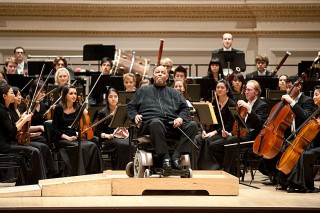Title
Subhead

The Juilliard Orchestra, with James DePreist conducting, at Carnegie Hall on February 20, 2010. Oliver Jia was the piano soloist for Prokofiev's Fifth Piano Concerto. Also on the program were Bortz’s Sinfonia No. 1 and Strauss’s Ein Heldenleben.
(Photo by Nan Melville)Although my first experience seeing James DePreist conduct was more than a decade ago, when he came to Atlanta, my hometown, to conduct the Atlanta Symphony Orchestra, my first time playing under his baton was with the Juilliard Orchestra in September 2009. This 9:30 a.m. rehearsal was a reading of Strauss’s Don Juan, always a scary piece. I’ll never forget the excitement, energy (and yes, fear) that many of my classmates and I felt at having had little time to prepare for our first Juilliard rehearsal. But Maestro DePreist gave us a very warm and welcoming speech that felt like a kickoff to a fruitful and productive school year. After raising his hands and giving the downbeat, we began, barely making it through the first sweeping phrase before he motioned us to stop. He gave a simple smile, didn’t say a word, and began again—and the second time through went that much better. I discovered then what I would learn even more so over the next few years. This man who had fought countless battles musically and extra-musically throughout the 20th century and the dawn of the 21st and who had a wealth of experience to bring to us all could communicate his encouragement and expectations with a minimum of words and gestures.
Body
As time went on, I asked him to become a mentor to me, and I feel honored to have learned so much from him. Sometimes he would share his wisdom and stories (conducting Rostropovich in the Dvorak Cello Concerto!) at his apartment, other times it was during rehearsal breaks. It wasn’t until really talking to him that I discovered how much history he had in him. One of my favorite experiences was when I played Mahler’s Fifth Symphony, one of my favorite orchestral pieces, with him at Avery Fisher Hall—and he conducted from memory. Being on stage with him conducting from memory made me realize how much knowledge and history he had with this piece—it was amazing. But we also talked about personal things—he gave me advice about concert managers and competitions and the pros and cons of having a solo career.
Studying with Maestro, most of us quickly learned that he wouldn’t spoon-feed us anything—he placed a great deal of the responsibility on us to make beautiful music. He always expected nothing less than the best from us, and showed us how to trust ourselves and trust that we were seasoned artists. Of course he knew the challenges we faced, and he would often crack jokes at our rehearsals, which let us know that he wasn’t all business.
I will never forget the courage, wisdom, and values Maestro practiced daily—and showed me through his teaching and mentorship. Even when playing the most difficult repertoire at a late evening rehearsal, he had faith we would all pull together to make something spectacular for people at Carnegie, Alice Tully, or Avery Fisher halls. And sure enough, every time we did. He knew we would always continue to represent the Juilliard Orchestra in concert at the highest level, under any conductor—and even more importantly, represent the world as artists, citizens, and true leaders of our craft.
Maestro, you are deeply missed, and your contributions and legacy will live forever. As I would always tell you when saying goodbye, thank you for everything.




